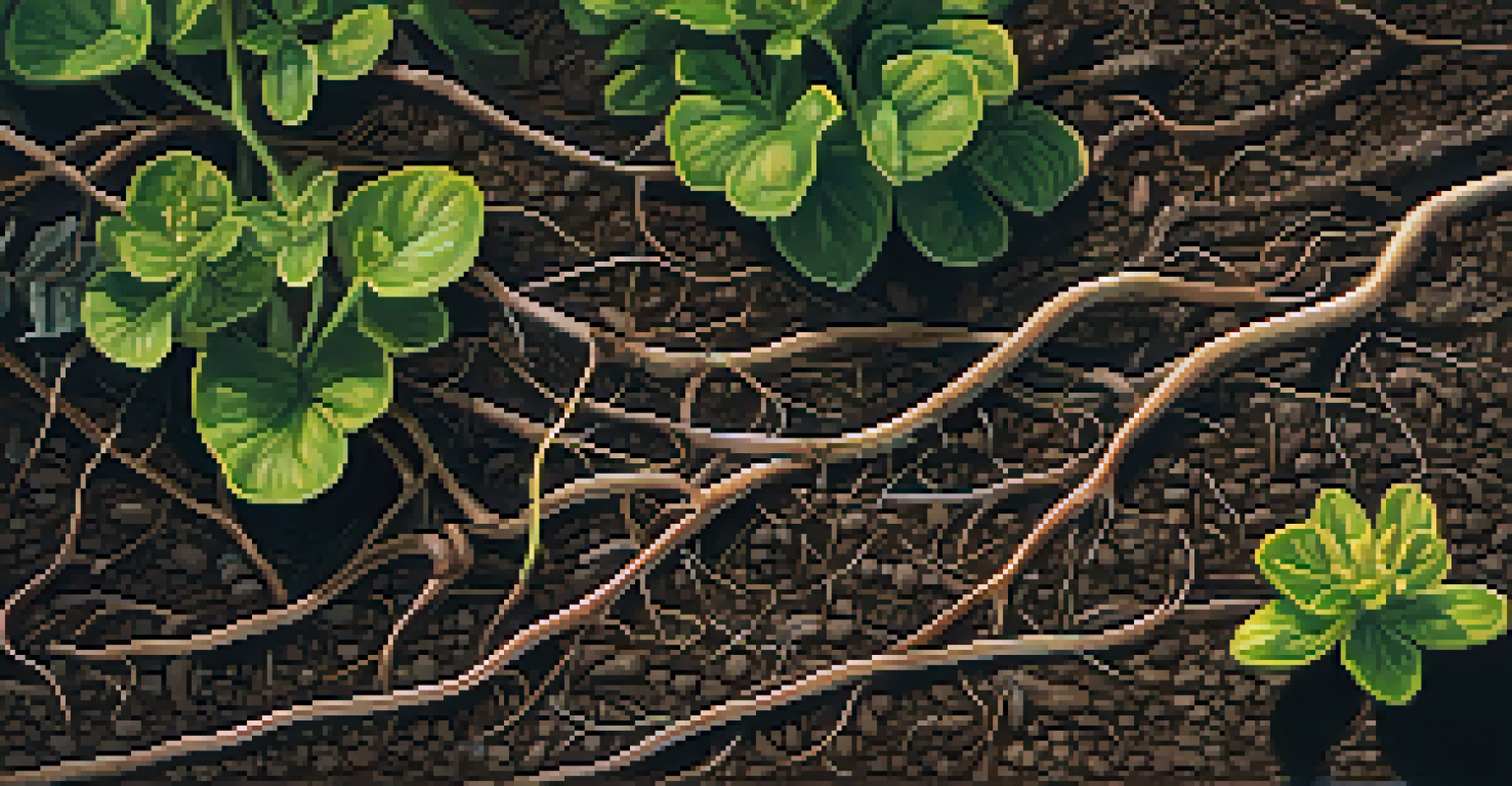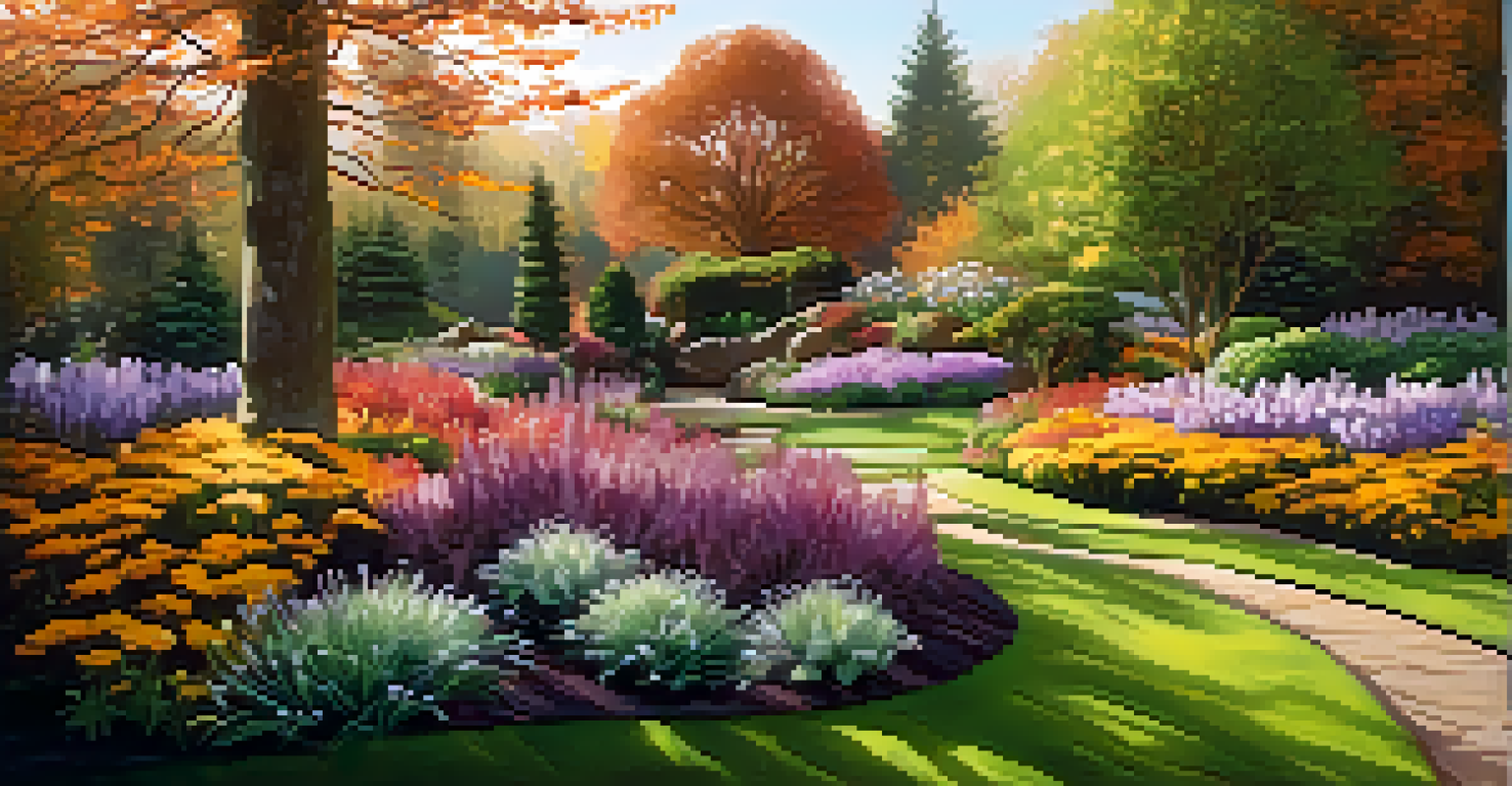The Benefits of Perennial Plants in Sustainable Gardening

Understanding Perennial Plants and Their Lifespan
Perennial plants are those that live for more than two years, returning season after season. This lifespan contrasts with annuals, which need to be replanted each year. By choosing perennials, gardeners can cultivate a more stable and resilient garden ecosystem.
Gardening is the art that uses flowers and plants as paint, and the soil and sky as a canvas.
Imagine planting a flower bed that blooms beautifully every spring without the need to replant. This not only saves time but also reduces the amount of resources spent on gardening activities. With perennials, you create a lasting impact on your garden’s aesthetics and maintenance.
Additionally, the longevity of perennials means they can establish deeper root systems. These roots enhance soil health and allow the plants to access water and nutrients more efficiently, which is crucial for sustainable gardening.
Promoting Biodiversity Through Perennial Choices
Biodiversity is essential for a healthy ecosystem, and perennial plants play a vital role in this. By planting a variety of perennials, gardeners can attract numerous pollinators, such as bees and butterflies, which are crucial for plant reproduction. This diversity creates a balanced environment that supports many forms of life.

For instance, a garden filled with different species of perennials can provide habitats and food sources for various insects and birds. This not only enhances the beauty of your garden but also contributes to the local ecosystem’s health.
Perennials Enhance Garden Longevity
Perennial plants thrive year after year, reducing the need for replanting and saving time and resources.
Moreover, diverse plant species can prevent pests and diseases, as a varied habitat is less susceptible to outbreaks. By incorporating perennials, you encourage a thriving community of organisms that work together to maintain a balanced garden.
Soil Health Benefits of Perennial Plants
One of the most significant advantages of perennial plants is their contribution to soil health. Their extensive root systems help to prevent soil erosion by stabilizing the soil. This is particularly beneficial in areas prone to heavy rainfall or wind.
The greatest gift of the garden is the restoration of the five senses.
Additionally, perennials can improve soil structure over time. As their roots penetrate the ground, they create channels that allow water and air to reach deeper layers of the soil. This leads to healthier soil that supports a thriving garden ecosystem.
Furthermore, many perennials contribute organic matter to the soil through their fallen leaves and decaying roots. This natural process enriches the soil with nutrients, reducing the need for synthetic fertilizers and promoting a more sustainable gardening approach.
Water Conservation with Perennial Plants
Perennial plants are excellent for promoting water conservation in gardens. Their deep root systems access moisture from deeper soil layers, reducing the need for frequent watering. This can be especially beneficial in regions facing water scarcity.
Think of perennials as nature's water savers. Once established, they can thrive with minimal irrigation, making them a smart choice for sustainable gardening. This efficiency not only saves you time but also conserves precious water resources.
Diversity Boosts Ecosystem Health
Planting a variety of perennials attracts pollinators and supports a balanced ecosystem, benefiting both the garden and local wildlife.
Incorporating drought-tolerant perennials can further enhance water conservation efforts. These plants are adapted to withstand dry conditions, ensuring your garden remains vibrant and healthy even during drier months.
Reducing Maintenance Efforts with Perennials
One of the appealing aspects of perennial plants is their low maintenance requirements. Once established, they typically require less care than annuals, allowing gardeners to enjoy their beauty without constant upkeep. This makes them ideal for busy individuals or those new to gardening.
Consider how much easier it is to have plants that come back each year without the need for replanting. This means less time spent on tasks like sowing seeds or replacing dead plants, giving you more time to enjoy your garden.
Moreover, many perennials are resilient and can tolerate various weather conditions, making them less susceptible to the stresses that often affect annuals. This natural hardiness means your garden can thrive with minimal intervention.
Seasonal Interest and Aesthetic Appeal of Perennials
Perennial plants offer year-round beauty, with many species providing blooms in different seasons. This diversity creates a dynamic garden that changes with the seasons, offering visual interest and enhancing the overall landscape. From spring blooms to fall foliage, perennials ensure your garden remains captivating throughout the year.
For example, imagine a garden with early-blooming perennials like crocuses, transitioning to vibrant summer blossoms like coneflowers, and finishing with the warm hues of autumn sedums. This variety keeps your outdoor space lively and engaging.
Cost-Effective Sustainable Gardening
Investing in perennials leads to long-term savings through reduced maintenance and replanting costs.
Furthermore, perennials can be used to create stunning focal points or borders in your garden design. Their long-lasting presence means you can establish a cohesive look that evolves beautifully over time.
Cost-Effectiveness of Perennial Gardening
Investing in perennial plants can be more cost-effective in the long run compared to annuals. While the initial purchase price may be higher, perennials return each year, eliminating the need for replanting. This means you save money on seeds and plants over time.
Additionally, reduced maintenance and watering needs can lead to lower gardening expenses. By choosing perennials, you're not just investing in plants; you're investing in a sustainable gardening practice that pays off in both beauty and savings.

Consider the long-term benefits: fewer purchases, less labor, and a flourishing garden that continues to thrive. This makes perennials not just an eco-friendly choice but also a financially savvy one.